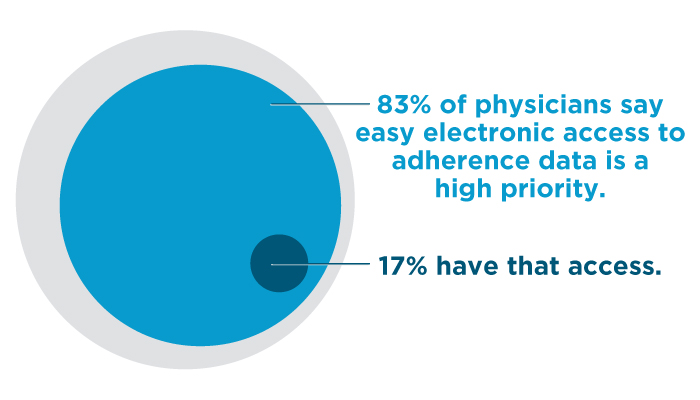Medication adherence or non-adherence is gauged by how closely a patient is following their prescribed medication regimen. One-third to one-half of U.S. patients do not take their medication as prescribed and two-thirds of medication-related hospital admissions are due to non-adherence, costing our healthcare system $100 billion a year.[1] Since 75 percent of doctor visits involve a medication therapy, medication adherence is critical to patient safety and outcomes.
A recent ORC International survey commissioned by Surescripts reveals that while 83 percent of physicians believe in the importance of access to medication adherence information for their patients, only 17 percent can easily retrieve it electronically.
This was the biggest gap identified between the importance physicians place on having a certain type of patient information and the reality of their access to it.
Even when this information is accessible, more than half of physicians don’t trust it. In fact, medication adherence information was the least trusted information type when compared to medication history (28 percent), medication cost (29 percent), drug formulary coverage (29 percent) and medical history (56 percent). This lack of trust was primarily attributed to physicians having to rely on patients for insights on their own adherence to their medications, and the fact that patients or their loved ones can easily omit or misreport this crucial information even in the best of circumstances.
Using Insights for Medication Adherence, clinicians can identify adherence issues and gaps in care with patient-specific medication summaries and real-time messages from pharmacy benefit managers (PBMs) and health plans within their EHR workflow at the point of care. With this information, clinicians can talk to their patients and get to the root cause of medication non-adherence, whether it’s due to unpleasant side effects or difficulty paying high out-of-pocket costs at the pharmacy.
To learn more about the state of physician access to and need for actionable patient intelligence, download the report Physician Perspectives on Access to Patient Data
[1] https://www.nacds.org/pdfs/pr/2012/nehi-readmissions.pdf;
https://www.ncbi.nlm.nih.gov/pubmed/12196047;
https://www.nejm.org/doi/full/10.1056/NEJMra050100


 Dean Riggott Photography
Surescripts
Dean Riggott Photography
Surescripts
